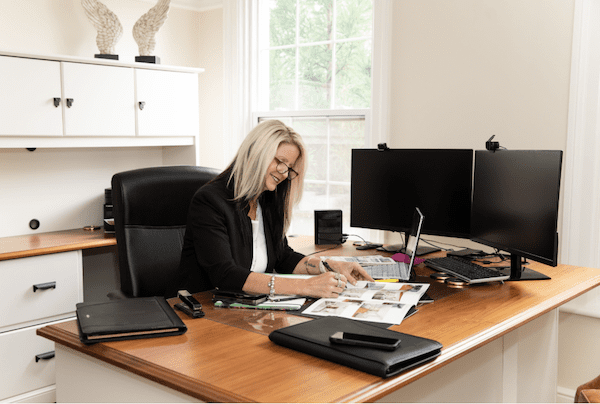With all that’s happened over the last few years, some people may hesitate before they buy, sell, or invest in real estate. Property values are up, then they’re down, they sell quickly, then they stall. (It almost sounds like a Katy Perry song!)
Through it all, there’s one question on everyone’s mind: Is real estate a good investment in today’s market? The answer is, it can be for the right person who has the resources and determination to reach their goals.
Where is the best place to invest in real estate in Canada? Our experienced Georgetown real estate agents can help you zero in on a property that works for you. You can also get an idea of what’s available by browsing our featured listings.
Real Estate Investing 101
How can you start investing in real estate in Canada even if you’ve never bought property before? A basic glossary will give you a solid foundation to build on. Here are some of the most common terms you should understand before making your next purchase or investment.
- Equity: Nearly everything you do in real estate revolves around equity. The simplest definition is the value of your assets minus any debt you owe. If you own a house worth $1 million and still have $500,000 on your mortgage, your equity is $500,000.
- Passive income: When money comes in through an asset you own rather than investing your time and effort, it’s known as passive income.
- Property appreciation: Many assets such as real estate will gain value over time. As value appreciates, your equity grows.
- Mortgage amortization: Amortization refers to the period of time you have to pay off a loan. Many mortgages have amortization periods of 25 years, but can go as long as 30 years in some instances.
- Cap rate: Also known as capitalization rate, this represents the income potential for a specific property. The calculation is your Net Operating Income (income minus expenses) divided by the purchase price. A lower cap rate generally signifies lower risk, but also less potential. A high cap rate means there’s potential for a high return on investment, but also a higher level of risk.
- Return on Investment (ROI): Return on investment means how much you earn from your property. This accounts for any income the property generates as well as your increased equity growth.
Are you getting ready to buy a new home for yourself or to rent out? Either way, the posts below can help:
- Looking for Your New Home? Now Is the Time to Think About What You Want
- How Long Does it Take to Buy a House in Ontario?
- What to Look for When Buying a House
Risks and Benefits of Investing in Real Estate
What are some of the benefits of investing in real estate vs stocks? Both can fluctuate, but there is a difference. Buying stocks equates to partial ownership in the company. If that business goes under, you could lose 100% of your investment. It may be less likely with larger companies, but it’s always a possibility.
Real estate values will rise and fall based on factors like interest rates, inflation, and seasonal demand. There are always risks in any investment, including when buying a rental home.
- Over the short term, real estate values could drop, causing a temporary loss of equity.
- It could take longer than anticipated to find a qualified tenant.
- A tenant could cause damage or fall behind on their rent payments.
Many risks in real estate investing can be offset through careful due diligence and a financial cushion to carry you through periods of vacancy. However, land will always be valuable.
You are unlikely to lose all of your investment, unless something drastic happens and you don’t have insurance. Done right, the benefits of real estate investing outweigh the downsides.
- When renting your property, you can earn passive income that covers all or most of your carrying costs.
- Over time, your equity will grow, giving you and your family financial stability for the future.
When and if you’re ready, you can cash out your investment by selling your home. The resources below will give you plenty of tips:
- Download Our Selling Tips E-book
- Download: Guide to Maintaining Curb Appeal
- How to Prepare Your Home for Sale on a Budget
To learn more about your risk tolerance, check out Is Real Estate a Safe Investment?
Techniques for Real Estate Investing
How and where to invest depends on your experience level and your tolerance for risk. A beginner might begin with a REIT (Real Estate Investment Trust), where a professionally managed fund with pooled resources allows you to invest in real estate without buying property.
An intermediate investor who already owns a home might consider taking in a tenant. Alternatively, you could keep your home instead of selling it when it’s time to upsize or downsize. Owning two properties amplifies your equity growth. Best of all, the home remains in your family.
Experienced investors often own multiple properties, including houses, townhouses, condos, or multi-unit buildings to rent out. A diverse portfolio requires access to greater capital. However, it also allows you to significantly expand your earning potential.
The best way to invest in real estate in Canada is to begin where you are, at a level that pushes your comfort level without taking any undue risks. If you feel intimidated at first, don’t worry. An experienced local real estate agent can walk you through the process step by step so you feel empowered and informed at each turn. You will learn as your knowledge and equity grow.
Ready to get started with your next investment? Our Georgetown real estate agents can help. Give us a call directly at 905-873-9944, email us at info@lisahartsink.com or fill out the form on this page to get in touch!

Get Started Today
Buying or selling in Halton Hills and Georgetown? See what the Lisa Hartsink Team is all about and how we can help you.




